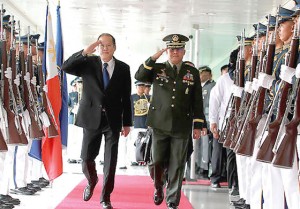President Benigno Aquino 3rd on Wednesday left for a working visit to Chicago in the United States, and a state visit to Canada from May 6 to 9.
The President and his party left at 8:20 a.m. on board Philippine Airlines Flight PR 001.
He was accompanied by Cabinet Secretary Jose Rene Almendras, Finance Secretary Cesar Purisima, Labor Secretary Rosalinda Baldoz, Trade Secretary Gregory Domingo, National Economic and Development Authority (NEDA) Secretary Arsenio Balisacan, Presidential Management Staff Secretary Julia Abad, Communications Secretary Herminio Coloma Jr. and Foreign Affairs Undersecretary Laura del Rosario.
In his pre-departure speech at the Ninoy Aquino International Airport (NAIA) in Pasay City, the President noted that his trip aims to promote a more open and stronger trade relations between the Philippines and the US and Canada.
“We will take this opportunity to strengthen our efforts to achieve our common objectives as well as entice businessmen in the US and Canada to invest in our country,” Aquino said in his departure speech originally delivered in Filipino.
During his one-day working visit to Chicago on May 6, the President will meet with leaders of large companies grouped in the US Chamber of Commerce and the US-Association of Southeast Asian Nations (Asean) Business Council.
“The US is our third major trading partner and we want to further intensify trade between our countries now that our economy is further booming. We will convey the country’s readiness in doing business with them and show them that the Philippines is more open for business,” he said, adding that he will also meet with the Filipino community in Chicago to convey to them the fruits of four years of reform carried out by his administration.
The President further noted that at the invitation of Canada’s Governor-General David Johnston and Prime Minister Stephen Harper, he will make his first state visit to the country on May 7 to 9.
During the visit, he will witness the signing of various memoranda of understanding and take the opportunity to thank Canada for its support to the Philippines, especially for sending military personnel and medical aid during the aftermath of super Typhoon Yolanda; for doubling its official development assistance to $111.95 million in grants in 2014; and for naming the Philippines as a “Country of Focus” for various forms of bilateral assistance from Canada.
The President is also scheduled to meet with Canadian businessmen and Filipinos living and working in Toronto and Vancouver.
The spokesman for the Catholic Bishops’ Conference of the Philippines (CBCP) called on the President to convince the Canadian government to take back the hazardous waste it shipped to the country two years ago.
“To request Prime Minister [Stephen] Harper to take back their trash is not only a morally correct and just thing to do, but also diplomatically sensible. President Aquino will not be breaking protocols or jeopardizing our relations with Canada by defending what is good for our people and the environment,” said Bishop Broderick Pabillo, chairman of the CBCP Public Affairs Committee.
Pabillo made the appeal to the President on reports that the Department of Environment and Natural Resources (DENR) has agreed to local disposal of the waste shipment from
Canada in deference to the two countries’ diplomatic relations.
Customs records showed that the waste arrived in the Philippines from Canada in July 2013.
The tons of waste, loaded in 50 40-footer container vans, were declared as “heterogeneous plastic scrap materials” but upon actual inspection, the cargo was found to contain mixed waste, including hazardous materials.
Customs Deputy Commissioner Ariel Nepomuceno earlier said shipping of toxic waste is a violation of the Basel Convention, an international treaty.
“Signatory countries to the Basel Convention are prohibited to ship hazardous garbage from one country to another,” Nepomuceno explained.
The garbage-filled container vans are stored at Manila and Subic ports despite calls made by environmental health and justice groups, labor organizations and even by concerned lawmakers to return the illegal garbage shipment to Canada.
Pabillo said it is not fair for the garbage of other countries to be disposed in another country, stressing that “no community deserves to be a dumping ground for wastes and toxics.”
“I hope that President Aquino will have the courage to raise this matter and get it resolved during his visit to Canada, and I also hope that Prime Minister Harper will respect our people’s right to a healthy environment and order the immediate return of their garbage. The expense is not the issue for Canada, but the goodwill that the country cares for the good of its partner country,” he added.
Pabillo cited the CBCP Pastoral Exhortation on Climate Change issued in October last year that encouraged every person to conduct an “environmental examination of conscience” to reduce “individual carbon print.”
“In what ways have we been excessive in our own consumption patterns, buying superfluous items, or patronizing goods that are harmful to the environment? Do we carefully observe regulations that are meant to protect nature, such as waste segregation, reducing harmful emissions from vehicles, and the use of biodegradable products?,” the pastoral exhortation said.
“Having examined ourselves and our relation to the environment, we are then obligated to ensure that our response is not just on the individual, but also on the community level. We are called to explore ways to protect our environment as well as to propagate this environmental awareness. When necessary we should lobby our government for legislation and advocate causes that will help curb environmental degradation caused by the excesses of industry,” it added.


